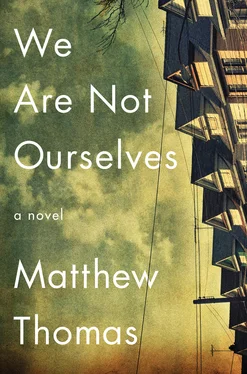1 ...7 8 9 11 12 13 ...148 She thought she saw a trace of a smile cross his lips.
When New Year’s Eve came around, he raised a glass to her, and everyone else gathered did too.
“Here’s to my Eileen for making the honor roll again,” he said to a loud cheer. “God bless her, we’ll all be working for her one day.” He paused. “And let me tell you, there must be something right with her if she can stand after half a dozen zombies. She’s definitely my daughter.”
She’s definitely my daughter . She heard a lifetime of unexpressed affection in the words. She imagined she could go for years on it, like a cactus kept alive by a sprinkling of rain. Still, she was so embarrassed that she decided never to drink anything but whatever the most boring girl in any group she was in was drinking.
From the moment students entered the doors of St. Catherine’s Nursing School, on Bushwick Street in Brooklyn, until the day they graduated, the one bit of knowledge instructors seemed most concerned to impart was that they’d be thrown out for poor performance, but Eileen was used to those tactics after thirteen years of Catholic education, and she knew that even if nursing wasn’t the field she’d have chosen, she’d been training for it without meaning to from an early age. There was nothing these veterans could throw at her that life hadn’t thrown already, and they somehow knew this themselves. There were times she could feel them treating her with something like professional courtesy. She couldn’t help thinking this was what it felt like to be her father, to be praised for something you’d never had any choice about, to wonder if there was a way out of the trap of other people’s regard.
Martyrdom was never her aim, the way it was for some of the halo polishers she went to school with. They might as well have joined the nunnery for all the secret satisfaction she heard in their voices when they complained about the exhaustion and thanklessness of it all. But they wouldn’t have lasted five minutes at a nunnery. They lacked the mental fortitude.
She’d never dreamed of being a nurse. It was just what girls from her neighborhood did when they were bright enough to avoid the secretarial pool. She would’ve preferred to be a lawyer or doctor, but she saw these professions as the purview of the privileged. She didn’t know how she’d ever have gotten the money to pursue them. She thought she might have had the brains for them, but she was afraid she lacked the imagination.
• • •
After St. Catherine’s she went on scholarship to St. John’s for her bachelor’s, enrolling in the fall of 1962. Her plan was to take summer classes, finish in three years instead of four, get through grad school, and begin the path to administrator pay. She earned spending money — and savings for the nursing administration degree tuition to come — as a dress model at Bonwit Teller. Women came to look at dresses and she showed them how they could look if they lost a few inches from their waist, or were taller, or had neat divots by their clavicle, or a galvanizing shock of black hair, or smooth skin, or arrestingly heavy-lidded, owlish emerald eyes. What they had on her was money and the insolent ease that came with it. Despite herself she became the preferred girl in the showroom. She didn’t try to push dresses on potential buyers by slinging a hand at the waist and jutting an elbow out. She simply put a dress on and stood there. She didn’t smile or not smile; make eye contact or avoid it; speak to customers or remain silent; she did whatever came naturally to her. If her nose itched, she scratched it. She turned to show them the dress at all angles when they asked her to, and when they were done looking at it, she went back to the dressing room and took it off. The other girls seemed to linger more, attempting to convince themselves of what they hadn’t convinced the customers of.
She daydreamed that the next person who walked in would be a rich man looking for a dress for his girlfriend, who would see her and change his mind about the drift his life was taking. He would let her forget about nursing, fly her around the world, care for her parents’ needs. She could sleepwalk through life, never changing a dirty bedpan, never batting away an exploratory hand when she leaned over a man in his senescence, never pressing through a fog of halitosis to take an old lady’s temperature, never working another day, never thinking another thought. She would come back to this store and sit in the chair and put the girl through her paces. She’d make it seem as if she was going to leave without buying anything, that she’d wasted everyone’s time, and then she would order one of everything to remind them that they had no idea how women like her really lived. But the only people who showed up were women a little older than her, or teenaged girls with their mothers. They said how radiant she looked, but she could hear them thinking of themselves.
One afternoon in April of 1963, a girl about Eileen’s age came in looking for dresses for her bridesmaids. The girl made apparently random selections, projecting a nervous aura. She looked familiar — alarmingly so; only after Eileen had modeled a handful of dresses did she realize the girl was Virginia Towers, who’d left St. Sebastian’s in seventh grade to move to Manhasset. Eileen prayed she wouldn’t recognize her, but while Virginia was examining the seams she started patting excitedly on Eileen’s shoulder.
“Eileen?”
“Yes?”
“Eileen! Eileen Tumulty!”
Virginia’s voice was all heedless abandon. Eileen raised her brows in silent acknowledgment, perturbed to be addressed so familiarly in a place where she’d worked to keep her distance from the other girls.
“It’s me, Ginny. Ginny Towers.”
“Virginia, my goodness,” she said mutedly.
Kind, sincere Virginia had been the only kid in her class with an investment bank executive for a father. Her father was also a Protestant, though her mother was a Catholic who’d grown up in the neighborhood. No one teased Virginia, even though she’d been shy and fairly awkward; it was as though her family’s means draped a protective cloak across her shoulders.
“What are you doing here?” Virginia asked.
There was no answer that wasn’t awkward, so Eileen gave the dress a demonstrative little tug in the chest and raised her hands in amused resignation.
“Right!” Virginia said. “Dresses.” She had two in her hands and three more draped across the armoire, none promising. “Well, hell. Do you like any of these?”
If Eileen had the money to buy bridesmaids’ dresses this expensive, she would buy different ones entirely — sleeker ones, less vulgar, more versatile. She was convinced she had nicer dresses hanging in her closet than Virginia did. She owned only half a dozen, but each was perfect. She would never buy five dresses for twenty dollars each when she could snag one truly gorgeous one for a hundred. She went out infrequently enough that she never worried about being seen too often in any of them.
“I think the one I tried on a couple of dresses ago is quite nice,” Eileen said.
“The lavender one? I knew it! I liked that one too. I’ll just have them order that one then.”
Standing in the billowing dress, Eileen felt like one of those men in sandwich boards advertising lunch specials.
“Eileen Tumulty ,” Virginia said, as though it were the answer to a quiz-show question. “I’m guessing this is just your day job.”
“I’m doing my bachelor’s,” she said. “I went to nursing school.”
“I figured you’d be on your way to being a doctor or something. You were always the smartest one of us.”
She felt her face redden.
Читать дальше
Конец ознакомительного отрывка
Купить книгу












